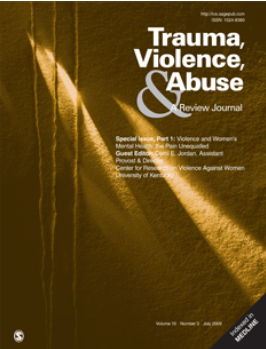Outcomes of Experiencing Interpersonal Violence in Autism: A Mixed Methods Systematic Review and Meta-Analysis.
IF 5.4
1区 社会学
Q1 CRIMINOLOGY & PENOLOGY
引用次数: 0
Abstract
In this review and meta-analysis, we aimed to examine outcomes of interpersonal violence among autistic people. Intersectionality and minority theories suggest that negative outcomes are heightened among people with multiple marginalized identities. Thus, we also aimed to investigate gender-related outcomes of interpersonal violence among autistic people. We conducted a systematic database search with inclusion criteria including mixed methods, peer-reviewed research examining any harmful interpersonal act (e.g., physical, sexual, and psychological) experienced by autistic people. We undertook a random-effects meta-analysis with pooled data from 9 studies, comprising 3,647 autistic participants aged 1 to 80 years. Violence was associated with worsened mental health, with the strongest association for internalizing symptoms (d = 0.66, p < .001; 95% CI [0.51, 0.80]) and suicidal thoughts and behavior (d = 0.63, p < .001; [0.44, 0.82]). Narrative synthesis of 57 studies comprising 37,418 participants (13,127 autistic, 24,291 non-autistic) found violence was associated with numerous adverse health, development, and functional outcomes, including worsened mental health and behavioral difficulties compared to non-autistic controls from childhood. Females and gender minorities reported greater intra- and interpersonal health and development difficulties related to violence, emerging in early childhood and enduring into adulthood. Findings provide strong evidence of lifelong negative outcomes associated with interpersonal violence experienced by autistic people, providing evidence for the relevance of minority stress and intersectionality theories in understanding risk. Indeed, our results raise concerns that autistic people, and particularly non-male (female, gender diverse) individuals, have higher susceptibility for abuse from a young age, while being conditioned to respond with social desirability, superficial adaptivity, and dissociation.自闭症患者经历人际暴力的结果:一项混合方法的系统回顾和荟萃分析。
在本综述和荟萃分析中,我们旨在研究自闭症患者人际暴力的结果。交叉性和少数群体理论表明,在具有多个边缘身份的人群中,负面结果会加剧。因此,我们也旨在调查自闭症患者人际暴力的性别相关结果。我们进行了系统的数据库搜索,纳入标准包括混合方法,同行评议的研究,检查自闭症患者经历的任何有害的人际行为(例如,身体,性和心理)。我们对9项研究的汇总数据进行了随机效应荟萃分析,其中包括3,647名年龄在1至80岁之间的自闭症参与者。暴力与心理健康恶化相关,与内化症状的相关性最强(d = 0.66, p < 0.001;95% CI[0.51, 0.80])和自杀念头和行为(d = 0.63, p < 0.001;[0.44, 0.82])。对包括37,418名参与者(13,127名自闭症患者,24,291名非自闭症患者)在内的57项研究的叙述综合发现,与儿童期非自闭症对照组相比,暴力与许多不利的健康、发展和功能结果有关,包括心理健康恶化和行为困难。女性和性别少数群体报告了与暴力有关的更大的内部和人际健康和发展困难,从幼儿期开始,一直持续到成年。研究结果提供了强有力的证据,证明自闭症患者经历的人际暴力与终生负面结果有关,为少数群体压力和交叉性理论在理解风险方面的相关性提供了证据。事实上,我们的研究结果引起了人们的关注,即自闭症患者,尤其是非男性(女性,性别多样化)个体,从小就对虐待有更高的易感性,同时他们也习惯于以社会期望、表面适应和分离来做出反应。
本文章由计算机程序翻译,如有差异,请以英文原文为准。
求助全文
约1分钟内获得全文
求助全文
来源期刊

Trauma Violence & Abuse
Multiple-
CiteScore
13.60
自引率
7.80%
发文量
131
期刊介绍:
Trauma, Violence, & Abuse is devoted to organizing, synthesizing, and expanding knowledge on all force of trauma, abuse, and violence. This peer-reviewed journal is practitioner oriented and will publish only reviews of research, conceptual or theoretical articles, and law review articles. Trauma, Violence, & Abuse is dedicated to professionals and advanced students in clinical training who work with any form of trauma, abuse, and violence. It is intended to compile knowledge that clearly affects practice, policy, and research.
 求助内容:
求助内容: 应助结果提醒方式:
应助结果提醒方式:


